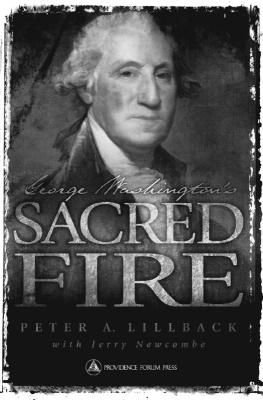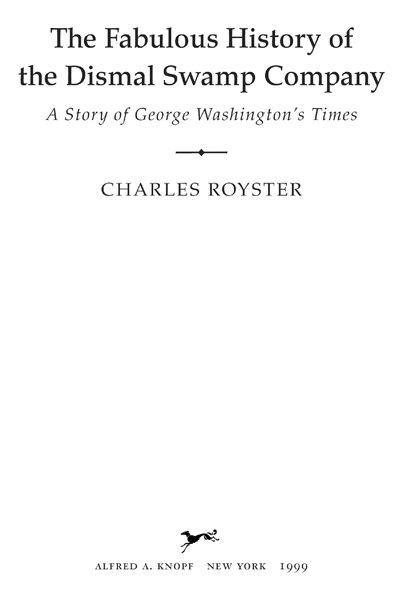Books by Charles Royster
The Fabulous History of the Dismal Swamp Company: A Story of George Washingtons Times
A Revolutionary People at War: The Continental Army and American Character, 17751783
The Destructive War: William Tecumseh Sherman, Stonewall Jackson, and the Americans
Light-Horse Harry Lee and the Legacy of the American Revolution
THIS IS A BORZOI BOOK
PUBLISHED BY ALFRED A. KNOPF, INC .
Copyright 1999 by Charles Royster
Maps copyright 1999 by David Lindroth, Inc.
All rights reserved under International and Pan-American Copyright Conventions.
Published in the United States by Alfred A. Knopf, Inc., New York, and simultaneously in Canada by Random House of Canada Limited, Toronto. Distributed by Random House, Inc., New York.
www.randomhouse.com
Knopf, Borzoi Books, and the colophon are registered trademarks of Random House, Inc.
Library of Congress Cataloging-in-Publication Data
Royster, Charles.
The fabulous history of the Dismal Swamp Company: a story of George Washingtons times / by Charles Royster. 1st ed.
p. cm.
eISBN: 978-0-307-77329-6
1. Dismal Swamp (N.C. and Va.)History18th century.
2. Washington, George, 17321799Friends and associates.
3. Political corruptionVirginiaHistory18th century. 4. Land speculationDismal Swamp (N.C. and Va.)History18th century.
I. Title.
F232.D7R69 1999
975.552302dc21 98-42773
v3.1
To
The Company of Players,
past and present,
of the Oregon Shakespeare Festival
PROLOGUE
The Lake of the Dismal Swamp
THERE ONCE WAS A YOUNG MAN whose beloved died. He lost his mindso people in Norfolk, Virginia, said in the autumn of 1803. In his ravings the lover denied that she was dead, insisting that she had gone to the Dismal Swamp nearby. The young man suddenly disappeared and never returned. He became a legend told to newcomers. He had gone into the Dismal Swamp in search of his beloved and had died of hunger, or been lost in some of its dreadful morasses.
Thomas Moore, a promising Irish poet, was twenty-four years old when he heard the legend. He spent a few weeks in Norfolk as a guest of the British consul, John Hamilton, awaiting passage to Bermuda. Moore followed the reading publics fancy; tales of apparitions, ghosts, and lovers mad with grief were in fashion. Sitting in Colonel Hamiltons big brick house on Main Street, Moore wrote a forty-line ballad, The Lake of the Dismal Swamp.
The crazed lover speaks first:
They made her a grave, too cold and damp
For a soul so warm and true;
And shes gone to the Lake of the Dismal Swamp.
Where, all night long, by a fire-fly lamp,
She paddles her white canoe.
And her fire-fly lamp I soon shall see,
And her paddle I soon shall hear;
Long and loving our life shall be,
And Ill hide the maid in a cypress tree,
When the footstep of death is near.
He enters the swamp and, surrounded by dangers, seeks the lake at its heart. Reaching the spot, he calls to his beloved.
And the dim shore echoed, for many a night,
The name of the death-cold maid!
He sees on the water the reflection of a meteor and takes it to be his loved ones light; he rows a boat in the direction it had moved.
The wind was high and the clouds were dark,
And the boat returnd no more.
But oft, from the Indian hunters camp,
This lover and maid so true
Are seen at the hour of midnight damp
To cross the Lake by a fire-fly lamp,
And paddle their white canoe!
During Moores stay in Norfolk, he and the consul rode out to see the swamp and Lake Drummond, named for William Drummond, once a colonial official in North Carolina, later hanged in Virginia for treason and rebellion against the Crowns government there. Moores ballad used the swamps reputation as a weird, ghostly, and threatening morass. To him, the swamp was a dreary wilderness. He found nature hostile in Virginia. A yellow fever epidemic had spread in the previous year. Norfolk had been hit by a tremendous hurricane during the previous month. Moore sailed for Bermuda without regret, taking from Virginia his ballad and a memory of dirty, odorous Norfolk, which, he said, abounds in dogs, in negroes, and in democrats.
The poet and the consul could ride into the Dismal Swamp more easily as a result of the work of gangs of slaves, who were digging a canal to link the waters of Chesapeake Bays tributaries with those of Albemarle Sound. Anyone could see that enterprising Virginians no longer feared the swamp. Trees were felled in ever greater numbers to provide timber for shipyards, as well as other lumber, staves, and shingles. Lake Drummond and the land around it belonged to the Dismal Swamp Company, founded forty years earlier to turn the swamp into farmland.
In those distant days, when George Washington was a young man, eminent Virginians were fascinated by land, excited by chances to acquire it. The previous fifty years had taught them that land, combined with the labor of slaves, was wealth. To a few men the Dismal Swamp seemed to beckon, inviting them to transform hundreds of square miles into inexhaustible riches.
The young Irish poet need not have come to Norfolk in 1803 to find a legend of a dead maiden, her obsessed lover, and their ghostly boat on a mysterious lake. The frightfulness of the swamp, even its gloomy name, heightened the impression of the distracted lovers desperation. Still, Moore could have set his ballad almost anywhere. The Dismal Swamp gave occasion for stories of conduct far stranger than the legend he heard, but he did not tarry in Virginia long enough to learn the remarkable history of the people possessed by a notion that they would recover what they had lost or find what they desired in the Dismal Swamp.
I
THE LAND OF PROMISE
ELIZABETH WIRT WAS PREGNANT in the summer of 1803. Her husband feared for her life. Too many women died in childbirth; he had lost his first wife. To distract his mind, he began a series of lighthearted, faintly satirical sketches describing Virginia and Virginians. Though he came from Maryland, William Wirt tried to make himself an eminent Virginian in law, in politics, and in letters. He had joined an informal college of wit-crackers whose dean was St. George Tucker in Williamsburg. His friends wrote verse and essays. So would he.
Wirt called his pieces The Letters of the British Spy, pretending they had been found in a boardinghouse. Readers knew Wirt was the author. Still, a catchy title and a pose of British condescension toward provincials helped attract notice as these sketches appeared first in newspapers, then, before the end of the year, in a small book. It was published after Elizabeth Wirt gave birth to a girl.









